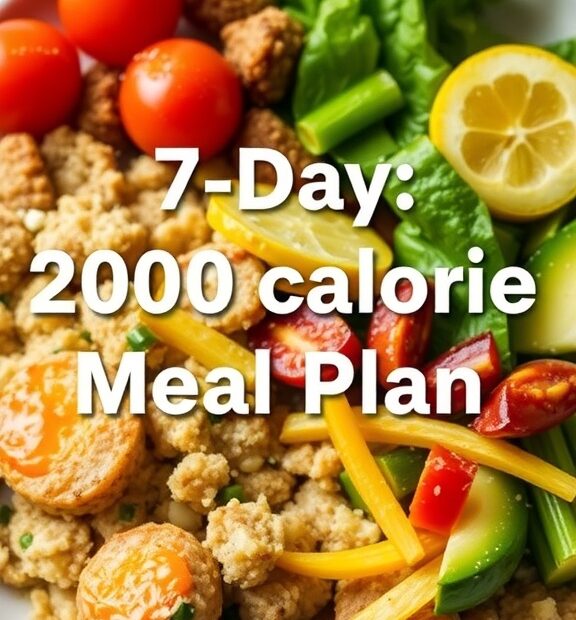A 7 day 2000 calorie meal plan is a structured approach to help individuals manage their dietary intake effectively while still enjoying flavorful and satisfying meals. This meal plan can be tailored to accommodate various cuisines and preferences, ensuring that the journey toward health is both enjoyable and sustainable. The goal of this meal plan is to provide balanced nutrition while adhering to the 2000 calorie limit.
Day 1:
- Breakfast: Greek yogurt with honey and mixed berries
- Lunch: Grilled chicken salad with assorted greens, tomatoes, cucumbers, and a vinaigrette
- Dinner: Baked salmon with quinoa and steamed broccoli
- Snacks: A banana and a handful of almonds
Day 2:
- Breakfast: Oatmeal topped with sliced banana and cinnamon
- Lunch: Whole grain wrap with turkey, spinach, and avocado
- Dinner: Stir-fried tofu with mixed vegetables and brown rice
- Snacks: Carrot sticks with hummus
Day 3:
- Breakfast: Scrambled eggs with spinach and whole-grain toast
- Lunch: Quinoa bowl with black beans, corn, and pico de gallo
- Dinner: Grilled shrimp tacos with cabbage slaw
- Snacks: Greek yogurt with granola
Day 4:
- Breakfast: Smoothie with spinach, banana, and almond milk
- Lunch: Lentil soup with whole grain bread
- Dinner: Roast chicken with sweet potatoes and green beans
- Snacks: Sliced apple with peanut butter
Day 5:
- Breakfast: Chia pudding topped with kiwi and coconut flakes
- Lunch: Caprese salad with mozzarella, basil, and balsamic dressing
- Dinner: Beef stir-fry with bell peppers and jasmine rice
- Snacks: Celery sticks with cream cheese
Day 6:
- Breakfast: Whole grain pancakes with maple syrup
- Lunch: Grilled vegetable sandwich with pesto
- Dinner: Pasta with marinara sauce and turkey meatballs
- Snacks: Cottage cheese with pineapple
Day 7:
- Breakfast: Smoothie bowl topped with granola and berries
- Lunch: Salad with chickpeas, feta cheese, and olives
- Dinner: Baked tilapia with asparagus and brown rice
- Snacks: Dark chocolate square and mixed nuts
This 7 day 2000 calorie meal plan emphasizes whole foods, lean proteins, and plenty of fruits and vegetables. By utilizing this plan, individuals can effectively manage their caloric intake while enjoying a diverse array of meals that cater to various tastes and dietary needs. This approach not only promotes healthy eating habits but also creates a sustainable lifestyle change.
